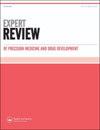Ivosidenib治疗IDH1突变的复发或难治性急性髓系白血病
IF 1.2
Q4 PHARMACOLOGY & PHARMACY
Expert Review of Precision Medicine and Drug Development
Pub Date : 2020-07-28
DOI:10.1080/23808993.2020.1792286
引用次数: 3
摘要
摘要简介急性髓细胞白血病(AML)的治疗仍然具有挑战性,尤其是对于那些用传统疗法预后不佳的复发或难治性(R/R)AML患者。这突出了在这一人群中需要新的治疗方法。涵盖的领域本综述将重点介绍伊沃西替尼,一种突变异柠檬酸脱氢酶1(IDH1)酶的口服抑制剂。IDH1突变的机制及其对伊沃西替尼的抑制作用,以及伊沃西替尼在R/R AML中的临床疗效和安全性。Ivosidenib已于2018年7月被美国食品药品监督管理局批准用于IDH1突变的R/R AML患者,并于2019年5月被批准用于IDH1-突变的不适合AML患者的一线治疗。专家评论Ivosidenib在预后不良的R/R AML人群中诱导了令人印象深刻的应答率。尽管如此,最近已经描述了对伊沃西替尼的原发性和获得性耐药性,强调了正在进行的伊沃西替与标准化疗、低甲基化药物或其他靶向治疗相结合的临床试验的重要性。本文章由计算机程序翻译,如有差异,请以英文原文为准。
Ivosidenib for the treatment of relapsed or refractory acute myeloid leukemia with an IDH1 mutation
ABSTRACT Introduction Management of acute myeloid leukemia (AML) remains challenging, especially for relapsed or refractory (R/R) AML patients who display poor prognosis with conventional therapies. This underlined the need for new treatments in this population. Areas covered This review will focus on ivosidenib, an oral inhibitor of mutated isocitrate dehydrogenase 1 (IDH1) enzyme. Mechanisms of IDH1 mutations and their inhibition by ivosidenib will be cover, as well as clinical efficacy and safety of ivosidenib in R/R AML. Ivosidenib has been approved by the FDA for R/R AML patients with IDH1 mutation in July 2018 and for unfit AML patients with IDH1 mutation as first line treatment in May 2019. Expert commentary Ivosidenib induces impressive response rates in R/R AML, a population of bad prognosis. Nevertheless, primary and acquired resistances to ivosidenib have been recently described, underlining importance of the ongoing clinical trials with ivosidenib in combination with standard chemotherapy, hypomethylating agents or other targeted therapies.
求助全文
通过发布文献求助,成功后即可免费获取论文全文。
去求助
来源期刊

Expert Review of Precision Medicine and Drug Development
PHARMACOLOGY & PHARMACY-
CiteScore
2.30
自引率
0.00%
发文量
9
期刊介绍:
Expert Review of Precision Medicine and Drug Development publishes primarily review articles covering the development and clinical application of medicine to be used in a personalized therapy setting; in addition, the journal also publishes original research and commentary-style articles. In an era where medicine is recognizing that a one-size-fits-all approach is not always appropriate, it has become necessary to identify patients responsive to treatments and treat patient populations using a tailored approach. Areas covered include: Development and application of drugs targeted to specific genotypes and populations, as well as advanced diagnostic technologies and significant biomarkers that aid in this. Clinical trials and case studies within personalized therapy and drug development. Screening, prediction and prevention of disease, prediction of adverse events, treatment monitoring, effects of metabolomics and microbiomics on treatment. Secondary population research, genome-wide association studies, disease–gene association studies, personal genome technologies. Ethical and cost–benefit issues, the impact to healthcare and business infrastructure, and regulatory issues.
 求助内容:
求助内容: 应助结果提醒方式:
应助结果提醒方式:


